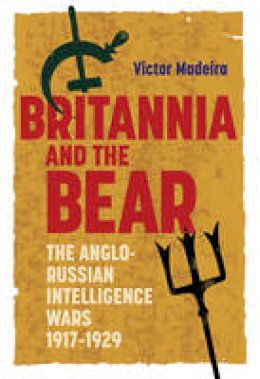
Stock image for illustration purposes only - book cover, edition or condition may vary.
Britannia and the Bear: The Anglo-Russian Intelligence Wars, 1917-1929
Victor Madeira
€ 148.79
FREE Delivery in Ireland
Description for Britannia and the Bear: The Anglo-Russian Intelligence Wars, 1917-1929
Hardback. A compelling new narrative about how two Great Powers of the early twentieth century did battle, both openly and in the shadows Series: History of British Intelligence. Num Pages: 339 pages, 12 black & white illustrations, 1 black & white line drawings. BIC Classification: 1DBK; 1DVU; 3JJF; 3JJG; HBJD; HBLW; JPSH. Category: (P) Professional & Vocational. Dimension: 241 x 158 x 27. Weight in Grams: 760.
Decades before the Berlin Wall went up, a Cold War had already begun raging. But for Bolshevik Russia, Great Britain - not America - was the enemy. Now, for the first time, Victor Madeira tells a story that has been hidden away for nearly a century. Drawing on over sixty Russian, British and French archival collections, Britannia and the Bear offers a compelling new narrative about how two great powers of the time did battle, both openly and in the shadows. By exploring British and Russian mind-sets of the time this book traces the links between wartime social unrest, growing trade unionism in the police and the military, and Moscow's subsequent infiltration of Whitehall. As early as 1920, Cabinet ministers were told that Bolshevik intelligence wanted to recruit university students from prominent families destined for government, professional and intellectual circles. Yet despite these early warnings, men such as the Cambridge Five slipped the security net fifteen years after the alarm was first raised. Britannia and the Bear tells the story of Russian espionage in Britain in these critical interwar years and reveals how British Government identified crucial lessons but failed to learn many of them. The book underscores the importance of the first Cold War in understanding the second, as well as the need for historical perspective in interpreting the mind-sets of rival powers. Victor Madeira has a decade's experience in international security affairs, and his work has appeared in leading publications such as Intelligence and National Security and The Historical Journal. He completed his doctorate in Modern International History at Gonville and Caius College, Cambridge.
Product Details
Publisher
Boydell & Brewer Ltd
Format
Hardback
Publication date
2014
Condition
New
Number of Pages
339
Place of Publication
Woodbridge, United Kingdom
ISBN
9781843838951
SKU
V9781843838951
Shipping Time
Usually ships in 7 to 11 working days
Ref
99-1
Reviews for Britannia and the Bear: The Anglo-Russian Intelligence Wars, 1917-1929
[A] fascinating and valuable account. AMERICAN HISTORICAL REVIEW A fascinating and wonderfully researched book. REVOLUTIONARY RUSSIA Madeira's study is an outstanding example of what can be achieved by piecing together intelligence and diplomatic history, offering at last the missing dimension to shed light on many political controversies. JOURNAL OF BRITISH STUDIES [A]n impressively researched and insightful history that highlights the centrality of the geopolitical rivalry between Britain and Russia
or, perhaps more accurately, the Soviet Union
and the importance of understanding the intelligence wars of the early twentieth century. H-NET Reviews Excellent . . . a pioneering work [that] should also appeal to anyone interested in modern politics, international relations and, as strange as it may sound, in Russia's present-day secret intelligence operations in Britain. THE SPECTATOR Intelligence historians have been so bedazzled by the Cambridge Five that we have neglected who and what came before. Victor Madeira's fascinating study takes us into the first great skirmishes of the long intelligence war between the UK and the Soviet Union, and he does not shrink from applying lessons to today's version of the duel. PETER HENNESSY, Attlee Professor of Contemporary British History, Queen Mary, University of London. Exciting and essential reading
not only for intelligence specialists
but for everyone interested in the secret battle between the British and Soviet superpowers during the interwar period. RICHARD J. ALDRICH, Professor of International Security, University of Warwick An impressive and sharply perceptive account of a key period in British and Soviet intelligence history. GILL BENNETT, OBE, MA, Chief Historian, Foreign & Commonwealth Office (1995-2005) This is history at its best
objective, penetrating analysis extremely well written, covering an important but neglected issue, and with lessons amazingly relevant to today. CHRIS DONNELLY, CMG, TD, Director, The Institute for Statecraft
or, perhaps more accurately, the Soviet Union
and the importance of understanding the intelligence wars of the early twentieth century. H-NET Reviews Excellent . . . a pioneering work [that] should also appeal to anyone interested in modern politics, international relations and, as strange as it may sound, in Russia's present-day secret intelligence operations in Britain. THE SPECTATOR Intelligence historians have been so bedazzled by the Cambridge Five that we have neglected who and what came before. Victor Madeira's fascinating study takes us into the first great skirmishes of the long intelligence war between the UK and the Soviet Union, and he does not shrink from applying lessons to today's version of the duel. PETER HENNESSY, Attlee Professor of Contemporary British History, Queen Mary, University of London. Exciting and essential reading
not only for intelligence specialists
but for everyone interested in the secret battle between the British and Soviet superpowers during the interwar period. RICHARD J. ALDRICH, Professor of International Security, University of Warwick An impressive and sharply perceptive account of a key period in British and Soviet intelligence history. GILL BENNETT, OBE, MA, Chief Historian, Foreign & Commonwealth Office (1995-2005) This is history at its best
objective, penetrating analysis extremely well written, covering an important but neglected issue, and with lessons amazingly relevant to today. CHRIS DONNELLY, CMG, TD, Director, The Institute for Statecraft
